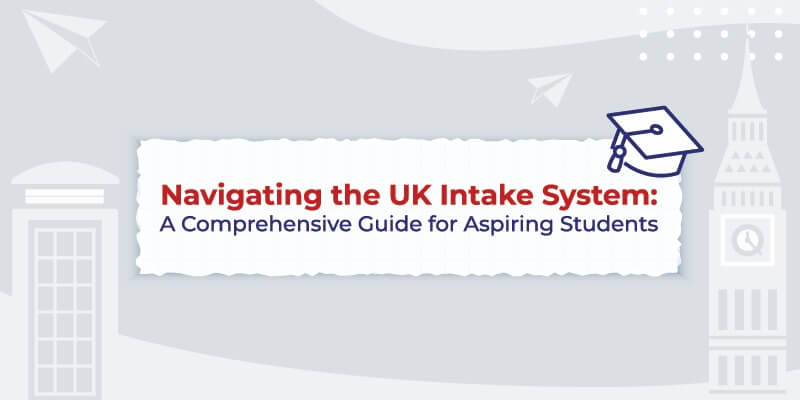Navigating the UK Intake System: A Compressive guide for Aspiring Students
For students hailing from worldwide, embarking on a journey to study in the United Kingdom often comes with a multitude of questions, one of the most frequent being, “How many intakes are there, and which one is right for me?” In the United Kingdom, the academic periods are commonly denoted as intakes, encompassing three distinct seasons: Autumn (September), Spring (January), and Summer (May).
Unveiling the Intakes
September Intake / Fall Intake
Starts from: September
Type: Main Intake
Pros:
1.Wide Course Variety: The September intake takes the spotlight as the primary intake, offering a plethora of courses across disciplines. From humanities to sciences, this intake provides a diverse academic landscape.
2.Weather Familiarization: Commencing your academic journey in September allows for a substantial period to familiarize yourself with the infamous British winter. This extra time proves invaluable, especially for those unaccustomed to colder climates.
3.Funding Opportunities: As the main intake, September opens doors to numerous funding and scholarship opportunities. Many institutions allocate a significant portion of their financial aid during this period, enhancing the chances of securing support for your studies.
4.Internship Availability: September also aligns with the peak hiring season for internships in the UK. The bustling academic and professional environment provides ample opportunities to gain practical experience alongside your studies.
Cons:
High Competition: Given its popularity, the September intake witnesses heightened competition for admissions. As a result, prospective students may find themselves facing a more competitive application process.
Expert Tip: Navigating the admission process during the September intake can be challenging, but our expert counsellors are dedicated to streamlining the process, ensuring you find and secure your desired program effortlessly.
January Intake / Winter Intake:
Starts from: January
Type: Secondary Intake
Pros:
Application Preparation: The January intake provides a unique advantage in terms of ample preparation time for meticulous application submission. This extended window allows you to fine-tune your materials and present a compelling case for admission.
Reduced Competition: Compared to the September intake, January sees a decrease in the number of applicants, resulting in reduced competition for coveted spots in programs. This factor can be particularly advantageous for students seeking a less competitive application environment.
Scholarship Opportunities: While not as abundant as in September, the January intake still offers opportunities for scholarships. Institutions understand the importance of attracting top-tier students during this period and allocate resources accordingly.
Internship Availability: Similar to September, internships remain accessible during the January intake. This aligns with the UK’s business and academic calendar, providing students with opportunities to engage in practical experiences alongside their studies.
Cons:
Weather Adjustment: One of the challenges associated with the January intake is the limited time available for students to adjust to the UK’s winter weather. Unlike the September cohort, January entrants have a shorter period to acclimatize.
May Intake / Summer Intake:
Starts from: May
Type: Least Preferred Intake
Pros:
Winter Adaptation Time: The May intake, also known as the Summer Intake, offers a unique advantage in terms of weather adaptation. With the program commencing in May, students have a substantial period to acclimate to North European winter conditions before the academic demands intensify.
Admission Ease: Being the least preferred intake among international students, May presents a golden opportunity for those who may have missed the earlier intakes. The reduced competition makes the admission process more accessible.
Scholarship and Internship Opportunities: Contrary to its lesser popularity, the Summer Intake still provides opportunities for scholarships and internships. Institutions understand the appeal of this intake for certain students and may offer incentives to attract top talent.
Cons:
Limited Course Availability: A potential drawback of the Summer Intake is the limited availability of courses. This is due to the fact that fewer programs are offered during this period compared to the more prominent intakes of September and January.
Note: If you find yourself in a situation where you’ve missed the earlier intakes, the Summer Intake could be the perfect window of opportunity, offering admission with relatively low competition.
Making an Informed Decision:
Understanding the nuances of each intake is crucial for making an informed decision based on your preferences, academic goals, and personal circumstances. Whether you opt for the diverse offerings of September, the less competitive landscape of January, or the niche opportunities of May, the United Kingdom eagerly awaits your academic journey.
In conclusion, the UK’s educational landscape accommodates a variety of preferences and timelines, ensuring that students can find an intake that aligns seamlessly with their aspirations. Embrace the journey, and let the academic adventure in the UK begin!







